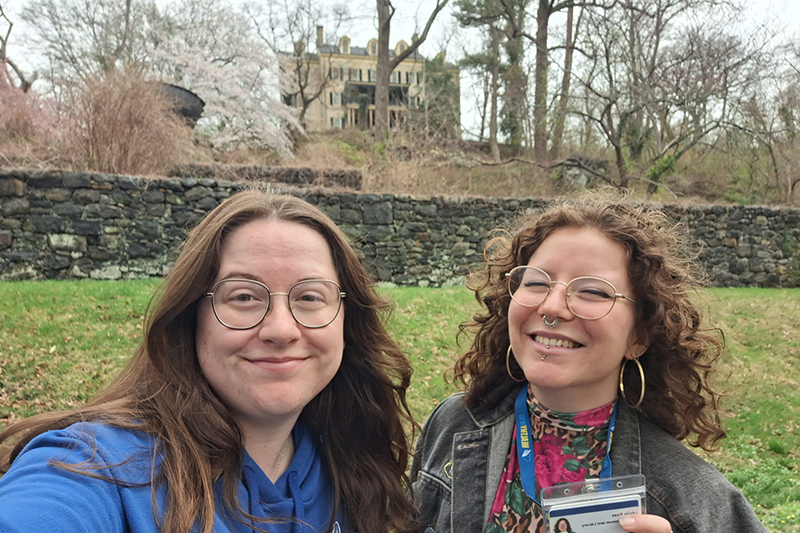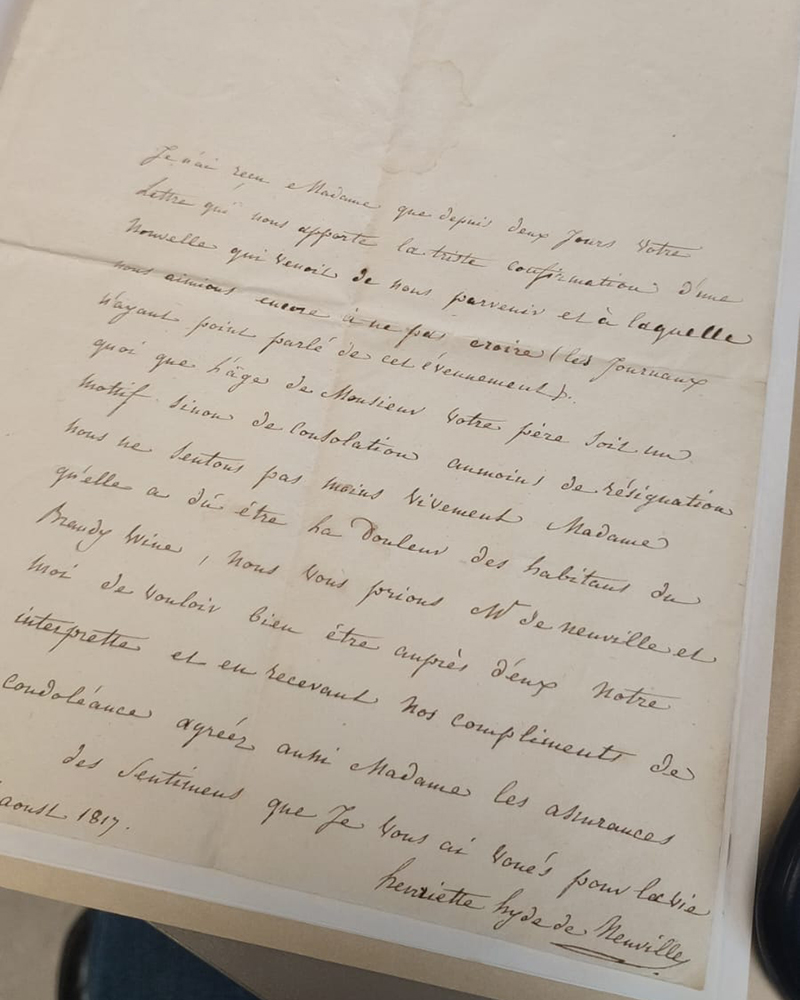


Lives in letters
Photos courtesy of Cécile Raas and Laurène Tabouillot September 29, 2025
French graduate students help reveal what life was like for women living in early 19th century Delaware
Returning to her hometown of Caen, France, after receiving a master of arts in French and Francophone literature from the University of Delaware Department of Languages, Literatures and Cultures in May, Laurène Tabouillot appreciated the familiarity of home, but she was also struck by the feeling that much had changed.
“When you come back, it’s all different, and it’s the same,” she said.
Tabouillot drew on an unusual source to validate and understand the feeling of returning home after an extended absence — 200-year-old letters from Baroness Henriette Hyde de Neuville, a French aristocrat who lived in the U.S. from 1807-1814 and 1816-1822 when her husband served as the French ambassador, written to Gabrielle Joséphine du Pont, sister-in-law of Dupont company founder Éleuthère Irénée du Pont. The du Pont family immigrated to the U.S. in 1800.
Tabouillot became familiar with the correspondence during an internship at Hagley Museum and Library, where she and fellow French graduate student Cécile Raas were tasked with transcribing and translating the 53 surviving letters.
Written between 1810 and 1835, the letters provide a testament to the women’s long friendship and give readers insight into the Francophile community living in the U.S. during the early 19th century.

When Raas and Tabouillot began the project, they didn’t expect to find commonalities between wealthy, noble families and their own lives, but they soon discovered connections.
“As a French student studying abroad for two years, we could understand the different outlook you have on your native land once you have left. We could relate to the different perspectives,” Tabouillot said.
Exploring language
During their studies at UD, Raas and Tabouillet worked on other translation projects, including Morris Library’s John Dickinson Writings Project and a collection of letters in the Hagley collection from a Haitian businessman dating to the 1791-1804 Haitian revolution. The experience helped them understand how their own native language has evolved.
“In English you have to go back to Shakespeare to have something that is difficult to understand,” Tabouillot said. “French ages faster than English, so French from the early 20th century will already feel dated. English, not so much.”
Raas noted that the different writing styles used by the baroness and salesman point to differences in class and education.
“The Baroness definitely had grammar classes, and her French is more similar to mine,” she said. “I sometimes read the salesmen’s letters out loud to understand them, because he had a more phonetic way of writing.”
They also discovered that the Baroness and du Pont inserted English words and phrases into their French correspondence, which felt familiar.
“Cécile and I do this, too, and it really annoys our friends,” Tabouillot laughed.
Enhancing understanding
Hagley’s Library, Research and Digital Archive focuses on preserving America’s business history, but its founding collection includes the du Pont family’s personal archives. These items have been less accessible to the public in part because they are in the family’s native French language. Additionally, previously translated material focused primarily on the men.
Head of Reference Services at Hagley Museum and Library Angela Schad explained that this is changing.
“We’ve had renewed interest in the du Pont women in the past few decades,” she said. Increasing access to the letters “fills in historical gaps.”
“These women didn’t live in isolation and didn’t exist just to support men and raise children. They were fully enmeshed in life,” Schad said.
Reading the letters helped Raas understand her own experience in navigating different identities as a French person living in the U.S.
“The most important part is building a community, and this is something we see in the letters,” she said.
“When we study history, we talk facts and numbers,” Tabouillot said. “Learning about the daily life of regular people humanizes the past. Even though it was a baroness and a du Pont, they had mundane concerns about their children and their friends.
“It was beautiful to see a friendship across so many decades, and how it never wavered,” she continued. “They only had letters and sometimes an ocean between them. I have Facetime, and it has still been hard to maintain friendships.”
Inspiring next steps
Professor of French and Comparative Literature Deborah Steinberger coordinates internships like the one at Hagley to provide opportunities for students studying French to explore career options. With support from the French Consulate and the Albertine Foundation, UD students have interned with an immigration law firm, at the French-American Chamber of Commerce of Philadelphia and with the Fulbright Commission in Brussels.
Tabouillot credits her Hagley internship with helping expand her idea of what is possible with her language skills. She is currently working as a guide for D-Day beaches and the American cemetery near Normandy.
“I don’t want to be a teacher, but I do love sharing with people,” she said. “I like the mix — conducting research and sharing it with an audience,”
Raas began a Ph.D. program in French at Princeton University this fall, but she appreciated experiencing work beyond the academic realm.
“The internship was a great way for me to see that the skills I’ve learned in the last few years are helpful in other contexts,” she said.
Hagley’s searchable digital archives include du Pont family correspondence, images and company records.
Contact Us
Have a UDaily story idea?
Contact us at ocm@udel.edu
Members of the press
Contact us at mediarelations@udel.edu or visit the Media Relations website

